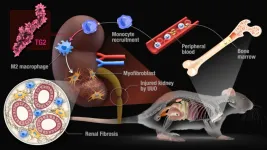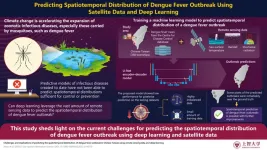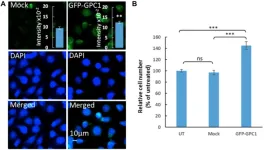(Press-News.org) Two landmark reports published today (23 March) by the British Ecological Society reveal that ecological sciences are losing out on funding compared to other sciences. The reports also set out a research agenda for ecology over the next 25 years.
With the twin crises of climate change and biodiversity loss, an ecological understanding of the world has never been more pivotal to the future of humanity and all life on Earth.
To further this ecological understanding and highlight the importance of ecology to our future, the British Ecological Society has published two landmark reports.
The Trends in UK Funding for Ecology report analysed changes in the amount of United Kingdom Research and Innovation (UKRI) funding available for ecological research in the UK. It found that although funding for ecological research increased 1.5 times between 2006 and 2021, funding for other research areas increased 2.8 times. This means that the proportion of UKRI funding given to ecology decreased over this period, a worrying trend at a time when ecological research has never been so vital.
Further analysis of overall funding for ecology in the UK revealed that it receives only a small proportion of funding from other public and private sources and that this small proportion is either holding steady or declining.
These combined trends for ecological research paint a bleak picture. The British Ecological Society urge UKRI and other public organisations to increase the amount of funding they provide to ecology to give people and nature the ability to fight back against the threats of climate change and biodiversity loss.
Professor Rosie Hails, Nature and Science Director at the National Trust, and key contributor to the reports said:
“This is the critical decade, what we achieve over the next few years will have a lasting impact for many generations to come. We need to make significant changes to our impact upon the environment to create a nature positive future. Ecological research will further our understanding of the natural world, and enable us to manage our land, freshwaters, and seas to deliver all the benefits we need for a sustainable future. Our life support systems rely on flourishing species and habitats.”
Sir Robert Watson, Director of Strategic Development for the Tyndall Centre for Climate Change Research at the University of East Anglia, who was not involved in the reports said:
“Given the importance of understanding how human activities are affecting our natural world, and consequently human well-being, ecological research is significantly underfunded compared to other areas of research. This needs to be remedied immediately if the UK is to meet its domestic and internationally agreed commitments to conserve and restore biodiversity.”
To tackle the global challenges the natural world faces, our Future of Ecological Research in the UK report has brought together leading experts to set out a vision for the future of ecological research.
The report identifies priority themes to advance our understanding of the natural world. These include, making sure ecological systems are resilient to a rapidly changing world; harnessing nature restoration projects into ‘living laboratories’ to provide new data and test approaches such as rewilding; and focussing our attentions on poorly understood ecological frontiers such as soils, forest canopies and the deep ocean.
Professor Bridget Emmett, BES President-Elect and Head of Soils and Land Use at the UK Centre for Ecology and Hydrology, and key contributor to the reports said:
“We need to accelerate the pace of developing new solutions to tackle biodiversity loss and climate change whilst supporting the well-being of our growing global population. This requires us to identify the problems and bottlenecks sooner and work through possible solutions in real-life situations, working with all sectors of society from local communities to land managers, business and governments. These spaces are called ‘living laboratories’ with the label emphasising that whilst they are places to rapidly test new ideas this is to be achieved working in partnership with people who are already committed to tackling these complex and challenging problems on the ground.”
-ENDS-
END
PRESS RELEASE FROM THE UNIVERSITY OF CAMBRIDGE
EMBARGOED UNTIL 00.05 LONDON TIME (GMT) ON 23 March 2023
Paper available at: https://drive.google.com/drive/folders/18wVryz17-8PmtYDudp5NPXE75onO12FF?usp=sharing
At least 80% of the world’s most important sites for biodiversity on land currently contain human developments, study finds
At least 80% of sites identified as being internationally important for biodiversity on land currently contain infrastructure − of which more than 75% contain roads.
In the future, more sites that are important for biodiversity could contain powerplants, mines ...
Researchers at Nagoya University in Japan have identified two enzymes that are involved in macrophage polarization, one of the key factors affecting fibrosis. The group’s findings, reported in Cell Death & Disease, suggest a potential treatment for human patients.
Kidney fibrosis is a dangerous inflammatory disease that causes the organs to stiffen and lose normal function. The disease is linked to a process called macrophage polarization. Polarization is the process by which macrophages, the white blood cells that help the body fight infection and repair tissue, are changed into two types as a response to changes in the microenvironment of the cell: the M1 type, which ...
Outbreaks of zoonotic diseases, which are those transmitted from animals to humans, are globally on the rise owing to climate change. In particular, the spread of diseases transmitted by mosquitoes is very sensitive to climate change, and Chinese Taiwan has seen a worrisome increase in the number of cases of dengue fever in recent years.
Like for most known diseases, the popular saying “an ounce of prevention is worth a pound of cure” also rings true for dengue fever. Since there is still no safe and effective vaccine for all on a global scale, dengue fever prevention efforts rely on limiting places where mosquitoes can lay their eggs and giving people an early warning when ...
Engineers are harnessing artificial intelligence (AI) and wireless technology to unobtrusively monitor elderly people in their living spaces and provide early detection of emerging health problems.
The new system, built by researchers at the University of Waterloo, follows an individual’s activities accurately and continuously as it gathers vital information without the need for a wearable device and alerts medical experts to the need to step in and provide help.
“After more than five years of working on this technology, we’ve demonstrated that very low-power, millimetre-wave radio systems enabled by machine learning ...
NEW YORK, NY--Columbia researchers have discovered how a genetic defect leads to spinal muscular atrophy (SMA), a critical piece of information about the disease that neurologists have been seeking for decades.
The discovery suggests a new way to treat SMA—a devastating childhood motor neuron disease that affects 1 in 6,000 children. In the most severe cases, and when left untreated, children born with SMA die within the first two years of life.
The researchers also used their finding to develop an experimental therapy that improved survival in mice with severe SMA by ...
“This study was designed to increase the knowledge on the potential of GPCs and in particular GPC1 as a biomarker in cancer diagnosis and prognosis.”
BUFFALO, NY- March 22, 2023 – A new research paper was published in Oncotarget's Volume 14 on March 21, 2023, entitled, “Attenuation of cancer proliferation by suppression of glypican-1 and its pleiotropic effects in neoplastic behavior.”
Glypicans (GPC1-6) are associated with tumorigenic processes and their involvement in neoplastic behavior has been ...
CAMBRIDGE, Mass.—Clean geothermal energy—the heat beneath our feet—has the potential to be cost competitive with other renewables and even fossil fuels if we can drill deep enough to access the mother lode of the resource. That’s according to one speaker at a geothermal conference last month held by the Society of Petroleum Engineers (SPE). Other speakers addressed growing interest in the field by the oil and gas sector, key challenges it faces, and solutions to help solve those challenges.
Geothermal 2023: Realising the Ambition was organized by the Aberdeen, ...
When natural habitats are cleared to make way for cities, roads and agriculture, this often leaves behind “islands” of fragmented habitat that can place species at risk of extinction. Species are at risk when they find it hard to move among habitat patches to find resources and reproduce.
By combining lab experiments and mathematical modelling, researchers at McGill University and the Swiss Federal Institute of Aquatic Science and Technology have found a way to predict the movement of species that could guide conservation efforts to reconnect fragmented habitats.
The ...
Scientists have gained new insights into the part of the brain that gives us a sense of direction, by tracking neural activity with the latest advances in brain imaging techniques. The findings shed light on how the brain orients itself in changing environments – and even the processes that can go wrong with degenerative diseases like dementia, that leave people feeling lost and confused.
“Neuroscience research has witnessed a technology revolution in the last decade allowing us to ...
PHILADELPHIA – The members of the American Association for Cancer Research (AACR) have elected Patricia M. LoRusso, DO, PhD (hc), as the AACR President-Elect for 2023-2024. LoRusso will become President-Elect on Monday, April 17, during the AACR’s Annual Business Meeting of Members at the AACR Annual Meeting 2023 in Orlando, Florida. She will assume the Presidency in April 2024 at the AACR Annual Meeting in San Diego, California.
LoRusso is a professor of medicine (medical oncology); chief of experimental therapeutics; associate cancer center director for experimental therapeutics; and leader of the Phase I disease aligned research ...




